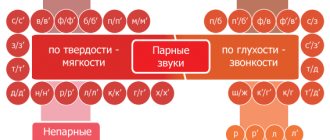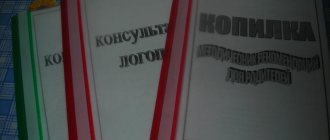DEVELOPMENT OF IMITATION
Imitation is one of the main ways a young child assimilates social experience. In this way, he learns everyday skills and masters speech. But imitation itself does not develop in a child right away; it requires teaching influence from an adult. Teaching a special child to imitate is one of the most important tasks of primary education, since special education imitation develops extremely slowly, which affects the acquisition of the practical skills necessary for the child.
Imitation is the repetition of an adult’s movements or his actions with objects that occur in full view of the child. The adult shows and the child repeats.
It is easier for a child to imitate movements than actions with objects. It cannot accurately reproduce the direction of movement and its scope. Moreover, it is difficult for him to reproduce an action with an object, which often consists of several successive stages. For example, to feed a doll, you need to take a spoon and hold it by the handle, bring it to the plate, then to the doll’s face, etc. A child will not be able to follow the order of operations in this complex action if it is performed by an adult quickly and without highlighting each stage. Therefore, the demonstration should be carried out slowly, with the recording of one or another moment and indicated by a word.
If the child does not imitate a given movement or action with an object, the adult should take his hands in his own and jointly perform the desired action, and then offer to repeat it himself by imitation.
"Birds"
Goal.
Teach a child to imitate the actions of an adult, develop emotional contact between an adult and a child.
Progress of the game.
The adult invites the child to come to him. "Do as I do. Let's fly like birds." - he says and raises his arms to the sides, waves them, runs around the room, dragging the child with him. Then he says: “The birds are pecking the grains.” (They squat down.) Do this.” (Knocks his hand on the floor.) The child repeats. The game is repeated 2-3 times. If the child does not repeat the actions on his own, then the adult takes his hands in his own and performs the movements together with the child “hand in hand.”
"Roll the ball"
Target.
Teach the child to imitate the actions of an adult with an object.
Progress of the game.
The adult sits at one end of the table, the child at the other. The adult places a collar between himself and the child, takes
the ball and says: “Do as I do,” rolls it through the goal to the child. He must roll the ball back.
Documentation of a teacher-defectologist in a group for children with a complex structure of the defect
Sections: Corrective pedagogy
A defectologist is a specialist in the field of defectology. – defectologist (in the broad sense of the term) – a specialist in the field of study, training, education and socialization of children with developmental disabilities. – defectologist (in the narrow sense of this term) – correctional teacher.
A complex defect is not just a combination, or a mathematical sum of two or more developmental defects. The combination of these defects gives a new quality; this conglomerate has a special structure that clearly distinguishes it from each anomaly or their simple sum.
The category of children with complex defects includes children with mental retardation, which is aggravated by hearing impairment and/or visual impairment. Complex defects include mental retardation, combined with hearing or vision defects, as well as deafness with somatic defects, such as diseases of the gastrointestinal tract, kidneys and liver, and congenital heart defects. And also children with autistic disorders, which accompany other developmental defects - mental retardation, mental retardation, etc., and sometimes manifest themselves in isolation.
A significant proportion of these children cannot cope with the pace of mastering the material of traditional correctional education and training programs, and experience difficulties in social adaptation and learning at school. These children need a special organization of educational work, the content, forms and methods of which must be adequate to their capabilities.
PMPK – psychological, medical and pedagogical commission. The purpose of PMPC is, on the basis of reliable diagnostics, to determine special educational needs and conditions that ensure the development, education, adaptation and integration into society of children and adolescents with developmental disabilities. PMPCs are engaged in the selection (determination) of appropriate educational conditions for each child with developmental disabilities, as well as in determining the nature of the accompanying medical, social and psychological assistance.
MSE - medical and social examination - determination in the prescribed manner of the needs of the examined person for social protection measures, including rehabilitation, based on an assessment of the limitations in life activity caused by a persistent disorder of body functions.
IPR - an individual rehabilitation program for a disabled child is a program of activities that is developed taking into account the individual characteristics of the physical condition and health status of the disabled person, aimed at restoring, compensating for impaired or lost body functions, and the disabled person’s abilities to perform certain types of activities.
Documentation of a teacher-defectologist in a group for children with a complex structure of the defect
1. General documents
– job description – occupational health and safety instructions
– work schedule of the teacher-speech pathologist for the school year
| Day of the week | Time |
– distribution of working time of a speech pathologist teacher
| Day of the week | Time | Kind of activity |
2. Work plan of a speech-language pathologist for the school year
| No. | Area of activity | Content | Deadlines |
3. Information about children
– list of children, date of birth, PMPC conclusion (summary table)
| No. | Child's full name | Date of Birth | Conclusion of the PMPC | ITU Conclusion |
– information about disabled children
| No. | Child's full name | Date of Birth | Home address | FULL NAME. parents | Place of work |
– PMPC conclusion, examination card for each child (copies) – ITU conclusion, IPR for each child (copies)
– agreement between the preschool educational institution and parents on psychological, medical and pedagogical support and examination of the child – psychological and pedagogical characteristics for the pupil for submission to the PMPK
4. Diagnostics
– normative documents – methodological recommendations – levels of development – symbols – diagnostic cards – dynamics map – ZUN graphs – results analyzes – appendix
5. Individual adapted programs for education, training and development of pupils
6. Journal of individual work
– attendance sheet
| No. | date Last name, first name of the child | September | |||||||||||||||||||
| 1 | 2 | 3 | 4 | 5 | 6 | 7 | 8 | 9 | … | ||||||||||||
– lesson schedule:
A) general
| Days of the week | Dominant educational fields | Contents of educational areas | Kind of activity | Time | Responsible |
B) for children attending preschool educational institutions for short-term stays
| Specialists | Day of the week | Time | Kind of activity |
– plan for individual work with students (notebooks)
| date Day of the week | Contents of educational areas (according to the lesson schedule) | Corrective and developmental tasks | Selection of material |
7. Notebook of interaction between a speech-language pathologist and a group teacher
| date | Defectologist's task | Teacher's mark on completion |
8. Notebook of interaction between MBDOU specialists in the group
| date | Teacher-defectologist | Educator | Psychologist | Music supervisor |
9. Interaction with parents of students
– consultation log
| Date Time | FULL NAME. counselee | The reason for petition | Nature of consultation, topic | Note |
- printed materials
10. Analysis of the activities of a teacher-defectologist for the year
11.06.2015
Share this page:
xn--i1abbnckbmcl9fb.xn--p1ai
Approximate types of documentation for a teacher-defectologist [DOC]
Explanatory note. Goals, objectives and principles of correctional education. Forms of organization of correctional work. A promising thematic lesson plan for the development of elementary mathematical concepts in the middle, senior and preparatory groups for children with mental retardation. Long-term planning of lexical material in the middle, senior and preparatory groups for children with mental retardation….
- 1.73 MB
- date added unknown
- modified 09/28/2011 15:13
Tasks for parents of preschoolers to consolidate material on lexical topics: “Berry”, “Days of the week. Parts of the day”, “Summer”, “Transport”, “Birds”, “Dishes”, “Late autumn”, “Clothing (winter), shoes, hats”, “New Year”, “Wintering birds”, “Migratory birds” ", "Winter", "Animals of hot countries", "Trees", "Wild animals", "Mom's holiday. Women's professions", "Mushrooms",...
- 517.68 KB
- date added unknown
- modified 03/23/2017 01:44
Cards for speech point (17 cards with tasks) for automating and differentiating sounds: s, s, z, z, ts, sh, zh, s-sh, sh-zh, z-zh, z-zh-s-sh, r , ry, ry, l, l, l-l, ts-s, h, h-ts, h-s, sch, sch-ch, sch-s, sh-sch. Compiled taking into account the recommendations of Bogomolova A.I. “Impaired sound pronunciation in children.” Convenient to use for individual work and homework. Sound C Sound S...
- 77.29 KB
- date added unknown
- modified 04/22/2018 00:15
A selection of different ways of producing sounds, collected from practicing speech therapists. Staging sounds. Posterior lingual. Making the sound “X” when replacing it with “T”. Making the sound "K" from "T". Making the sound “K” while inhaling. Making the sound “K” from the correct “X”. Making the sound “K” by imitation. Making the sound “X” from the correct soft “H.” " Making the sound “X” from...
- 34.23 KB
- date added unknown
- modified 10/18/2010 19:11
Individual program for the education and development of a child of primary preschool age with mental retardation. Individual program for the education, training and development of a child of senior preschool age with mild mental retardation Individual program for the education, training and development of a young child with a significant delay in mental and motor development
- 42.61 KB
- date added unknown
- modified 07/06/2010 14:36
M.: Iris-press, 2005. - (Library of educational psychologist). 46 album sheets (stimulus material) + methodological recommendations + cover Diagnostic materials are the result of twenty years of practical work. They were tested on children with various types of developmental disabilities (dysontogenesis). The album includes both classical developments and original ones…
- 73.34 MB
- date added unknown
- modified 01/09/2019 03:26
www.twirpx.com
Defectologist's page. State educational institution "Secondary school No. 1 of Skidel"
| date | Friday | Subject | Group of people for whom consultation is carried out | Location |
| September | 14.09 11.30-12.15 | 1. Organization and goals of providing correctional and pedagogical assistance in the PKPP. | Parents of students enrolled in PKPP | Defectologist's office |
| 21.09 11.30-12.15 | Special children – special communication | Parents, teachers working in integrated classes. | Defectologist's office | |
| October | 11.10 11.30-12.15 | Why is articulation gymnastics needed? Technique for performing articulation exercises. | Parents of students enrolled in PKPP | Defectologist's office |
| 18.10 11.30-12.15 | The need to develop memory, attention, thinking, speech and creativity. | Parents, teachers working in integrated classes. | Defectologist's office | |
| November | 15.11 11.30-12.15 | Disorders of written speech in children of primary school age. | For teaching staff (2nd grade teachers) | Defectologist's office |
| 22.11 11.30-12.15 | Features of cognitive activity and emotional sphere of students with learning difficulties and intellectual disabilities. | Parents, teachers working in integrated classes. | Defectologist's office | |
| 29.11 11.30-12.15 | Automation of sounds using gaming techniques. | Legal representatives of the child. | Defectologist's office | |
| December | 13.12 11.30-12.15 | Speech games on the way home. | Legal representatives of the child. | Defectologist's office |
| 20.12 11.30-12.15 | We breathe correctly and speak beautifully. Sets of breathing exercises for children with OPFR. | Parents of students, primary school teachers. | Defectologist's office | |
| January | 18.01 11.30-12.15 | Erased form of dysarthria (difficulty in producing and automating sounds) | Parents of 1st grade students | Defectologist's office |
| 25.01 11.30-12.15 | Intermediate results of a survey of oral and written language among students enrolled in PKPP. | Parents of students enrolled in PKPP (on individual requests) | Defectologist's office | |
| February | 08.02 11.30-12.15 | Formation of coherent speech. | Parents of 1st and 2nd grades | Defectologist's office |
| 22.02 11.30-12.15 | Development of children's cognitive activity. Entertaining games for speech development. | Parents, primary school teachers. | Defectologist's office | |
| March | 15.05 11.30-12.15 | Dysgraphia. How to help a child with dysgraphia at home. | Parents of 2nd graders. | Defectologist's office |
| 22.03 11.30-12.15 | Features of mathematical concepts in children with learning difficulties. | Parents of students, teachers working in integrated classes | Defectologist's office | |
| April | 12.04 11.30-12.15 | Phonemic hearing is the basis of correct speech. | Parents of students, primary school teachers. | Defectologist's office |
| 19.04 11.30-12.15 | “The most common mistakes adults make when teaching children to read at home.” | Parents of students. | Defectologist's office | |
| May | 10.05 11.30-12.15 | Recommendations from a teacher-defectologist for reinforcing material in the summer. | Parents of students, primary school teachers | Defectologist's office |
| 24.05 11.30-12.15 | How to prepare a child for school? Speech and the child | Parents of students. | Defectologist's office | |
| During a year | 11.30-12.15 | Consultations upon request of parents and teachers | Parents and school teachers. | Defectologist's office |
skidel1.schools.by







